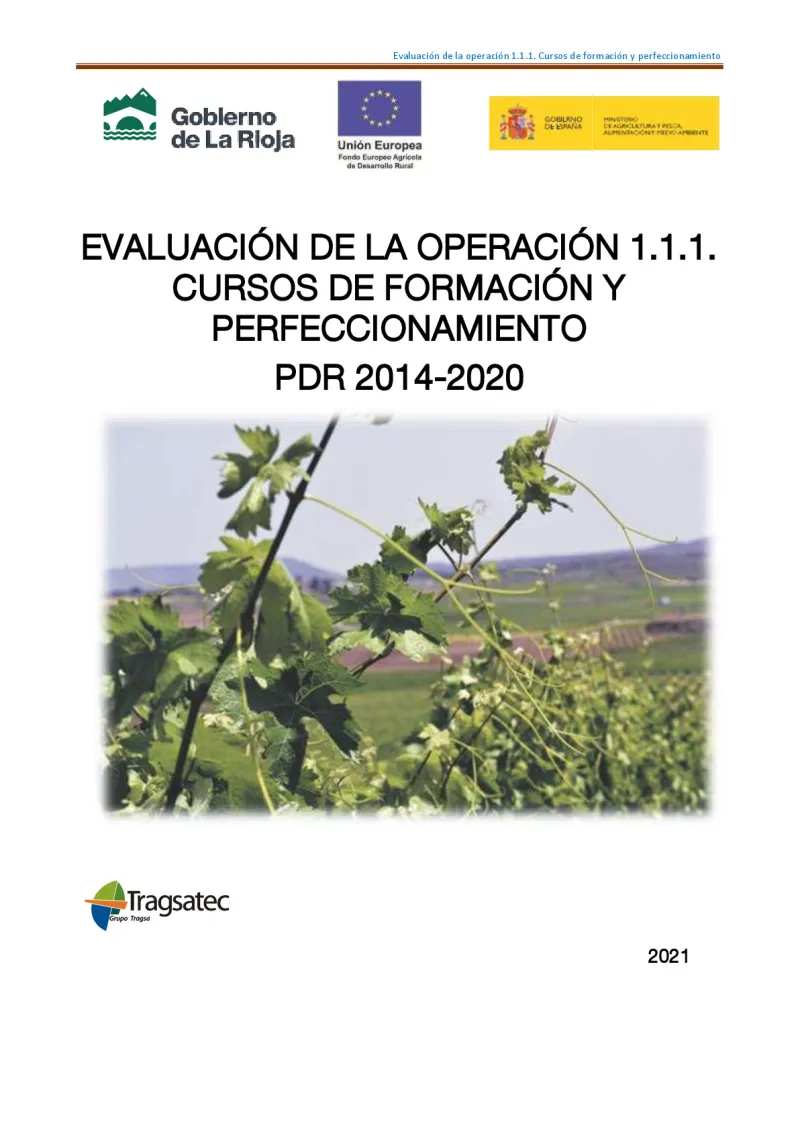Evaluation of Operation 1.1.1. of the 2014-2020 RDP
The La Rioja 2014-2022 Rural Development Programme (RDP) prioritised knowledge transmission as a core element of its training and advisory activities, enhancing technical skills among farmers and rural professionals to improve farm management and economic diversification.
- Spain
- 2014-2022
- Environmental impacts

The transmission of knowledge has been promoted as a central pillar for training and advisory activities subsidised by the 2014-2020 RDP of La Rioja. This was intended to provide better technical resources to professionals in the agricultural sector and other inhabitants of rural Rioja, so that they can better exercise their activity on their farms or rural businesses. The main objective of the aid is therefore to improve the training of farmers in the management of their farms and to promote economic diversification activities for the rest of the rural population.
This study is focused on the training activity Operation 1.1.1 (training and further training courses implemented by the RDP), and analyses in-depth the implementation of the measure, the thematic distribution of the courses taught, as well as collecting information and opinions that allow conclusions to be drawn in order to make better decisions when designing the next programme.
As outlined in the European Commission’s guide to ex-post evaluation of RDPs, the evaluation is structured into three phases. In addition, the information needed to answer the previously asked questions was also analysed. The necessary data sources for the analysis (previous evaluation studies, statistical databases, related bibliography, etc.) have also been identified. For study topics for which no information is available, ad hoc survey forms and interview scripts have been designed to obtain primary information that meets the needs of the assessment.
The next phase of evaluation has been the development or implementation of the evaluation itself, i.e. the analysis of RDP monitoring data, examination of statistical sources, extraction of relevant information from the various bibliographical references, as well as the conduct of surveys and interviews. Two types of surveys have been developed; one aimed at all the training beneficiary entities, and one aimed at the other participants of the courses. The analysed monitoring data were the latest available at the date of this report, i.e. those included in the 2020 AIR, which have a reference date of 31 December 2020.
The final phase of the evaluation consisted of disseminating and communicating the results. The results of the study have been limited in part by the low representativeness of the answers to the questionnaires carried out. Regarding the survey of participants, 75% of the surveyed entities estimated that the new system of payment for aid through simplified cost modules has been effective for organising training activities. The managing unit pointed out that this system allowed a homogeneous treatment of eligible costs. Despite this, almost half of the entities have pointed out that adjusting expenses to the amount of the module made it difficult to organise and develop training activities. As a result, there are training activities in demand that fall outside the scope of the training plan. In this sense, the manager proposed that the obligation of periodic reviews be established to correctly adjust the modules to reality.
The study also revealed that there is a clear digital divide in the rural population, so it was essential to enhance the organisation and attendance of courses to teach and deepen the use of information and communication technologies (ICT), as well as create synergies with other aid to improve coverage and internet connection.
Lastly, the success of training activities depends on the publicity given to such activities and, therefore, on the knowledge. The publicity of carried out training activities was facilitated differently by both the public administration and the training entities.
Author(s)
Tragsatec